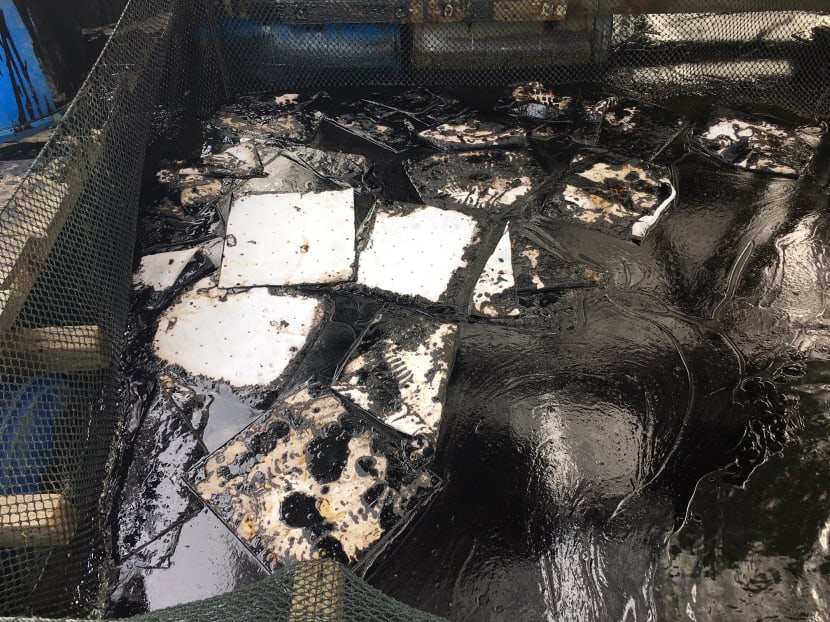Authorities embark on clean-up along Singapore coastlines after oil spill
SINGAPORE — A day after two ships collided in Johor waters, oil patches were found along coastlines in the north-eastern part of Singapore, while an 800m stretch of Changi Beach was closed on Thursday (Jan 5) to clean up the oil spill.

A box containing oil-soaked sheets at Mr Timothy Ng’s 2Jays Pte Ltd fish farm. Mr Ng said no more than 10kg of fish at his farm had died due to the oil spill on Jan 3, 2017. Photo: Alfred Chua/TODAY
SINGAPORE — A day after two ships collided in Johor waters, oil patches were found along coastlines in the north-eastern part of Singapore, while an 800m stretch of Changi Beach was closed on Thursday (Jan 5) to clean up the oil spill.
A second fish farm in the affected area also reported fish deaths from the spill, although the authorities said most farms were spared and impact on supply was “minimal”. Nonetheless, some farms have been told to suspend sales, until food safety tests are completed.
Apart from Changi Beach, oil patches were also found along the shorelines of Noordin beach at Pulau Ubin, and the beaches at Punggol and Pasir Ris, said the National Environmental Agency (NEA). They were also found off the Cafhi jetty, also at Changi Beach and along the shorelines of Changi Point Ferry Terminal, as well as Changi Sailing Club, said the Maritime and Port Authority of Singapore (MPA) on Thursday evening.
About 300 tonnes of oil gushed into the waters off Singapore on Tuesday night after two ships collided off Pasir Gudang Port in Johor.
When TODAY visited Changi Beach on Thursday afternoon, cleaners were seen clearing up oil-coated sand near Changi jetty, and placing oil-absorbent pads into the water. They had been working there since morning.
There was a distinct stench of oil in the air and a handful of beachgoers could be seen in the area.
Not far from the jetty, bag after bag of sand coated with oil was heaped along the seashore.
The NEA has advised the public to exercise caution when visiting the affected beaches and to avoid the stretches where cleaning work is being carried out.
Clean-up work aside, the authorities on Thursday also stepped up their efforts to contain the oil spill. The MPA increased the number of vessels deployed to clear up the oil patches to 17, from nine the previous day. Its spokesperson said 222 personnel were involved in the clean-up efforts.
The National Parks Board (NParks), which deployed oil-absorbent booms along Pulau Ubin’s north-eastern coast, Pasir Ris Park and Coney Island Park on Wednesday to protect mudflats and mangrove areas, said “the booms have kept the oil out of the biodiversity sensitive sites”.
“We will continue to monitor the impact of the oil spill on marine life and share more details when this is ready,” it added.
Meanwhile, fish farmers were on Thursday counting the cost of the damage arising from the oil spill, while the Agri-food and Veterinary Authority (AVA) said more farms in the East Johor Strait have found oil on their nets and premises, due to tide movement.
Two farms have reported fish deaths, amounting to 100 to 250kg across both farms. The AVA said it has issued notices to suspend sales to three farms, and more will be issued if more farms become affected.
When TODAY visited Mr Timothy Ng from 2 Jays Pte Ltd at his farm off the north-western coast of Pulau Ubin, cleaning personnel could be seen working to remove swathes of black oil.
This was “the largest such incident” to hit his 12-year-old farm, which is among those hit with a suspension. A visibly-disappointed Mr Ng said he could not do much with his fish stock now, except to put aerators into the fish cages to pump in fresh air.
“We cannot feed any fish now, since the food will be contaminated, so for now, we will just have to wait and see,” said Mr Ng, adding that “no more than 10kg” of fish had already died due to the oil spill.
His farm has around 10 tonnes of fish and seafood, and four employees.
Mr Tan Choon Teck, from FC57E Fish Farm, said his entire 3ha farm was covered with oil and cleaning-up works were in progress.
He said in Mandarin: “I’m worried if my fish would die from a lack of fresh air (due to the thick layer of oil). I’m worried also because we cannot feed them,” he said, adding that the AVA had taken a few of his fish for tests.









